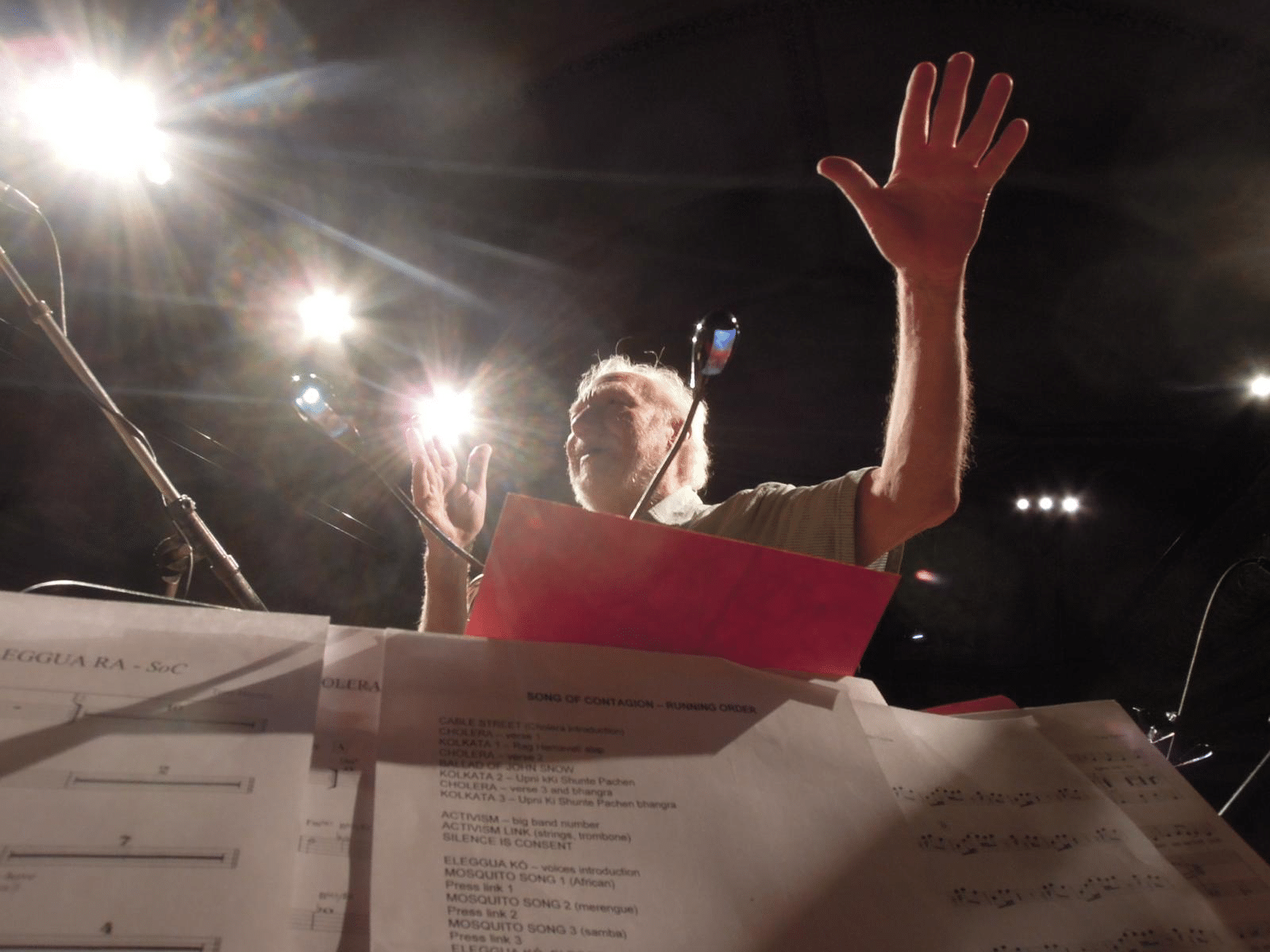Chris Biscoe worked closely with Tony Haynes for fifty years. In this tribute he delves into his own memories of an inspiring musical leader, and has also collected short tributes from several Grand Union/ Red Brass colleagues, such as Tony Kofi: “‘He allowed me to express myself the only way I knew…” and others. In sadness.
Tony Haynes’s name will always be associated with Grand Union. As the composer, director and driving force behind the music, the presentation and organisation, he touched and often transformed the lives of countless people – musicians, administrators, audiences alike.
There are many facets to Grand Union including small bands, street bands, youth band (GUYO), workshops, and large scale projects integrating groups both amateur and professional into stage shows.
The public face of Grand Union is the Orchestra which performed regularly at the Hackney Empire and other major venues, presenting ambitious and complex meetings between a jazz big band and musicians from many different cultures.
Grand Union’s long term bass player, Andres Lafone: ‘Thank you Tony, thanks to you I played music from Bangladesh, India, China, Romania, Turkey, Ghana, Nigeria, South Africa, Mozambique, Senegal, not to mention music from my own Hispanic world, Brasil, English folk, the list is endless..scintillating charts that induced a cold sweat. What an education! Praise the Grand Union Orchestra’.
The following is from the sleeve notes to Around the World in 80 minutes and gives a fair insight into the methods of Grand Union:
‘But this CD is also a melting pot of melting pots: whether based in London, Lisbon or Melbourne, each of the different combinations of musicians reflects the cosmopolitan nature of the local scene….we make no pretence at purity of style: the ‘authenticity’ of this music lies in the creative personality of the individual musicians’.
Tony formed Redbrass in 1975. Tony had been musical director with various theatre companies, including Nottingham Playhouse, Liverpool Everyman, a founder member of Belt and Braces and had written scores for plays by Adrian Mitchell and John Arden. This was around the time when Mike Westbrook’s Brass Band was developing from street band to concert band and jazz was being integrated into independent theatre. I think Tony’s experience in funded theatre set him on a different path from other jazz musicians of the time. His ambition was to have a regular band which could travel the country playing at all sorts of venues which wouldn’t have been possible for an unfunded band. He set out to have a touring grant and administrative help and succeeded – in a modest way. We had a coach, which was always breaking down. After I woke up on an all-night journey and realised the frost was on the inside of the window I was happy when we reverted to hired Transit vans.
Redbrass got its name from Tony’s Yamaha trombone. It was a ten piece band with two saxes – Pete Hurt and me – and Paul Nieman on trombone. Later on Dick Pearce and Marc Charig played in the band. It also featured three singers, including Josefina Cupido, with contrasting voices and styles of singing, and the music incorporated jazz-rock fusion, jazz ballads and folk influences. For a while Heather Jones, who was Redbrass’s Linda Ronstadt, took on the roles of all three singers.
Tony’s grounding in independently minded, Arts Council-funded theatre was central to the creation of Redbrass He was determined that the songs would have a clear political theme, and that the band would be funded so that it could play outside the jazz circuit and receive wider recognition.
Over four years Redbrass played 200 gigs, including Millom, where the audience were expecting to hear a brass band, Wall’s End, where the audience of three men and a dog included two journalists who reviewed the performance, and Aberdeen, where Annie (at that time Anne, flute, piano and voice) Lennox’s lovely grandmother came to the gig. In Cumbernauld we played a puzzling performance in a community centre while Jean Muir dresses were modelled to our political jazz rock backing. This turned out to be excellent for record sales, since no one could afford the dresses.
Tony sometimes had a wicked sense of humour. Once he demanded that the brass section prove its grasp of the backing harmonies to Mouth of the Tyne by singing them, while the rest of the band fell about laughing. There is a cassette somewhere……
After Redbrass disbanded in 1979 there was a hiatus in which Tony returned to the theatre, and discovered two multi-instrumentalists, Gerry Hunt and the late Keith Morris, who were central to the development of his music and the new band, Grand Union Orchestra, which became his life’s work. Gerry Hunt, Louise Elliott and Ros Davies have been with Grand Union from the beginning and are the multi-talented constants around whom Tony piloted his curious and enduring musical space craft. Here’s Kevin Robinson’s take on a similar theme: ‘I always harboured the thought that he was the keeper of his own unique universe, glimpses of which we were only privy to on a need to know basis… he always saw the bigger picture… which became obvious only at the end of the always soul enriching performances’
Grand Union’s started from the basis of a jazz big band while giving space to performers from other cultures. At first this was mainly through the addition of South American musicians, particularly Chilean singer, writer and instrumentalist Vladimir Vega, who came to the UK as a political exile. Subsequent bands developed contacts with musicians and musical cultures from Portugal, Turkey, South Asia, China, Australia, Africa and countries within those continents. As Tony began to take bands around the world these links broadened and strengthened.
As well as Louise Elliott on tenor sax and flute, Tony liked to feature particular instruments and soloists in settings which dramatised the themes of the show. He loved pitting two altos against two trumpets. He wrote with particular soloists in mind but, always aware of the precarious nature of the music business and the need for musicians to juggle various commitments, he was unfailingly generous in supporting our need to work elsewhere, and consequently had a roster of soloists to call on, including Claude Deppa, Byron Wallen, Shanti Paul Jayasinha, Kevin Robinson, Tony Kofi, Jason Yarde and me.
Although the band was called on to play in support of many different musical cultures, the improvisation side was always featured. Every member of the band would have their own story to tell. I felt particularly privileged to play improvised duets with Sabahat Akkiraz, Kutub Uddin and Baluji Shivastrav. Tabla virtuoso Yousof Ali Khan has been most important to the development of our work with the Indian classical tradition.
Now…the singers. Redbrass featured three vocal soloists. Tony loved to write for singers. In Grand Union he built ever more complex vocal ensembles with up to six soloists, while giving space to choirs of the most varied abilities. He even had the entire band singing four part harmony. The soloists have space to perform in their native traditions – Lucy Rahman from Bangladesh, Sarah Laryea from Ghana, for instance – but also have to cross over into sometimes unfamiliar ensemble territory. A great test of spirit and nerve. Richard Scott, as well as having a huge range and distinctive voice, acts as musical director for the singers.
Education has always been a strong theme in Grand Union’s work. The contacts with local choirs, schools and instrumental groups led to increasingly ambitious large scale projects, filling entire stages with recorder ensembles, percussion from across the world, singers and instrumentalists.
There have been many tributes from people who promote and present music including Ros Rigby: ‘Grand Union were very much ahead of the game in terms of celebrating diversity in music’…Nod Knowles: ‘A true internationalist, dedicated to the last’…Denise Jones: ‘I was privileged to coordinate ‘Songlines’ – a spectacular collaboration which brought the best of GUO to the S Wales valleys, many decades ago. An incredibly inspirational experience which touched and changed so many lives, especially mine’
Alex Dmoch: ‘First met him when I was 12 and just started playing sax, couldn’t have asked for a better person to nurture and encourage me as a young musician and set me on my path’….Kavuma:
‘He was always so warm and encouraging whenever I was in his presence. And the music was always beautiful, eye opening and inspiring’…Lusius: ‘Very sad news a beacon for new generations a great legacy’.
Claire Hirst: ‘Ah Tony, he really helped me and many other musicians out in the early days’…Ros Davies: ‘I wouldn’t be the person I am without Tony. I learnt to be a musician’…Gerry Hunt: ‘So sad to see a great person and friend go. Truly the end of an era. We need more good forces of nature like him in this world’…Shanti Paul Jayasinha: ‘I credit Tony for opening my ears to so much music’.
Tony Kofi: ‘He allowed me to express myself the only way I knew and helped me to develop it from there through his beautiful compositions’…Davina Wright: ‘You have indelibly touched the hearts of all those who knew you’…Yousof Ali Khan: ‘I cherish the 35 years of friendship we shared’ Steve Fox – ‘The cleverest man I ever knew’…RIP Tony
Jane Deppa:’ The Grand Union ‘family’ looks forward to keeping Tony’s creative flame burning as we go into the future with him watching from the wings’. Members of Grand Union call it the family. It’s a very extended family, with folk who stay home and mind the business, others in far corners of the world, some who come home occasionally and are always welcomed with open arms. As Tony Kofi says ‘Tony always gave the best hugs’
And Brian Abrahams: “We have all lost a dear friend , an incredible musician and composer/ arranger of music on a higher level. No one could ever produce such visionary spectacular musical journeys as our Tony Haynes. What an honour to have had the privilege to work under his orchestral leadership for many years”
I’d like to finish with words from Ash, one of the newest recruits to Grand Union:
‘I am only a very young trumpet player who was given the opportunity to play with the Grand Union Youth Orchestra, where I performed timidly my first solo impro. Through Tony’s encouragement I pursued my interest in music and was acquainted with a diversity of world music styles. But what impressed me most about Tony was his persistent insistence on inclusivity and diversity, his love of humanity and his sense of justice and fairness expressed through his music. Making music something that serves a social purpose and value. A great example to be followed. He will be missed’.
LINK: RIP Tony Haynes


